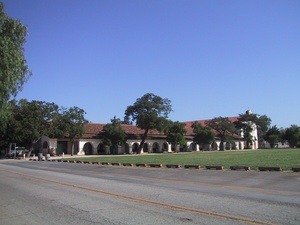The City of San Juan Bautista is located 40 miles south of San Jose, nestled in the heart of the San Juan Valley between the Gabilan Mountains and Flint Hills.
Founded in 1869, San Juan Bautista bills itself as "the city of history." Although the surrounding area is largely agricultural, the city derives much of its income from tourism.
The settlement grew up around Mission San Juan Bautista, from which the city takes its name,
The mission was founded in 1797, and is the 15th of the 21 California missions. Due to its relatively isolated location, much of the mission has survived, and it is still an active Catholic church. The church building was completed in 1812, and it is the largest in the California mission system.
Notably, the mission was used as a setting for the climactic scene in the Alfred Hitchcock classic film Vertigo, released in 1958.
The mission building faces an open square which is the last surviving Spanish town plaza. The plaza is maintain by the California Department of Parks & Recreation, as the San Juan Bautista State Historic Park. There are a number of historic buildings located around or near the plaza, including:
- Plaza Stable – Built in 1870, the stable handled the extensive stage and wagon traffic flowing thru San Juan Bautista.
- Plaza Hotel – Originally built in 1814 as a barracks for Spanish soldiers. It was purchased in 1858 by Angelo Zanetta, who added a second story and converted it to a hotel.
- Plaza Town Hall - Purchased in 1869 by Zanetta, who converted it to a private residence.
- Castro-Breen Adobe – A large adobe house, built in 1838 for Mexican General Jose Antonio Castro. It was purchased in 1848 by Patrick and Margaret Breen, survivors of the ill-fated Donner Party, immigrants stranded by snow in the Sierra’s during the winter of 1846-47.
- Town jail, settlers cabin, cemetery and Indian burial grounds.
The main commercial district of San Juan Bautista lies along Third Street, just two blocks from the mission and plaza. Many of the buildings along the street were constructed in the 1800s. Today, most the the buildings are shops and restaurants catering to visitors.
San Juan Bautista is also noted for its theater company, El Teatro Campesino. Founded in 1965 by the cultural arm of the United Farm Workers union, the company relocated to its current home in San Juan Bautista in 1971. The theater has achieved national attention as one of the foremost Hispanic theater companies in the United States.
Demographic Data (2019)
Population: 2,327
Cost of Living: 38% higher than US average
Median Home Price: $424,700 (130% higher than US average)
Median Household Income: $59,643 (8% higher than US average)
Crime: 1,187 incidents per 100,000 people (57% lower than US average)



